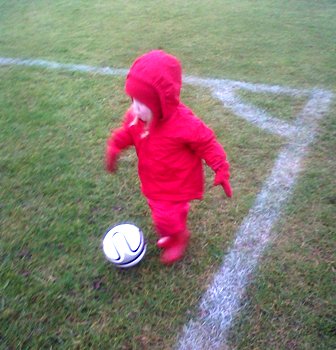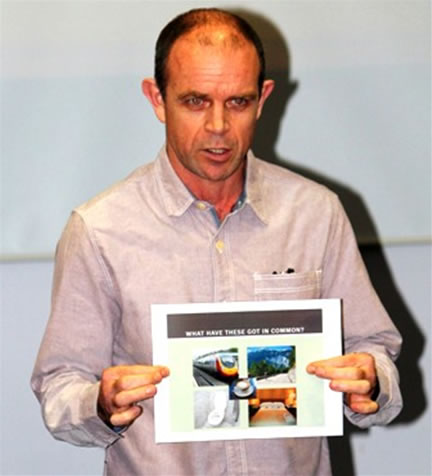
Getting the message: how many of our early memories of sport are positive?
The coached experience: stories and recollections beyond winning and losing
At a recent conference the memories of delegates demonstrated all too clearly that positive early experiences were far more important than winning in generating enthusiasm for sport and participation. Richard Cheetham considers why “well done” might be the most powerful words in sport.

Getting the message: how many of our early memories of sport are positive?
Within the workshop titled Beyond Winning and Losing at the recent Professional Association for Directors of Physical Education in Independent Schools (PADSIS) conference delegates were asked to recall – in no more than three words – some of their positive coached experiences and then to recollect stories that have stayed with them from their school sport or from participating in sport within clubs. Their words were displayed around the room on large sheets of paper, which were labelled “memory walls”.
Fun, enjoyment, trust, respect, challenge, inspirational, adventure and freedom were the emerging themes from the group. Some of their stories were then shared with everyone: a coach playing guitar on the bus to matches; the trust bestowed on a year group when they wanted to do extra training in the gym; and let’s not forget ‘Silky’ – a nickname that remains to this day for a footballer converting to rugby but forgetting the appropriate dress code (no silky shorts allowed!). These deeply rooted memories were spoken with energy, plenty of humour and great enthusiasm. The wish would have been to see their coaches and PE teachers in the room to hear how these experiences had positively influenced their lives. And the one word that was missing from the lists? No one identified it when the delegates were asked. That word was ‘winning’.
The debate had highlighted what coaches may need to focus on and draw from their own memory walls, and this debate could help to further develop positive coaching and learning environments. The findings from this conference workshop, along with additional research by the author, serve to encourage a coaching approach that goes deeper than the aspects of just winning and losing. Poczwardowski, Barot & Jowett (2006) recognise the dangers of not adopting a more holistic view of the coach-athlete relationship, commenting that focusing on the athletic performance “invites a risk of misjudging the kinds of influence coaches have on their athletes”.
The workshop session opened with a story from the speaker. As the pupil crossed the finish line in the school cross country, 57th from over 200 runners, his PE teacher delivered the simple and yet hugely significant words: “Well done.” Not a winner, not even close, but the victory was the recognition of effort which came from a positive and encouraging environment. Those words have stayed with that runner ever since and they were influential in the shaping of his attitude towards sport. As Professor John Kotter, once of Harvard Business School stated, “We learn best and change from hearing stories that strike a chord with us”.
As the speaker’s story was told it too appeared to strike a chord with the audience. Stories can help people remember the emotion attached to the event at that particular time and it was this opening part of the seminar that clearly allowed those teachers and coaches in attendance to recall their emotions attached to tales from the past. The laughter in the room was a clear sign to all that somewhere someone who had taught or coached them had left a lasting impression on their lives. The environments that many had come from indicated a strong athlete-coach or student- teacher relationship, which was reflected by such positive experiences. Fry (2010) highlights that numerous researchers recognise the pivotal role coaches play in enhancing this ‘experience’ and a life-long enjoyment in sport and physical activity can be the lasting legacy of this. Cope, Bailey and Pearce (2013) review of literature on why children participate and stay in sport identified that youth sport coaches should place greater emphasis on positive behaviours, emphasise fun and enjoyment over winning and competition.
So how do the story-telling recollections support this research? Let us introduce Jonny Tudor (a conference delegate and a keen sportsman) struggling to hit a moving softball in his PE lesson; effort not in doubt but skill somewhat lacking. The teacher places the ball on a marker cone creating a new static target. As the ball disappears into the distance, the teacher offers the immortal words loud and clear: “Hallelujah, Jonny Tudor!” As the years passed these words were remembered, and a deeply rooted positive and emotional experience was shared with everyone at the workshop.
The delegates' ‘coached and taught’ experiences, evident in both the stories and the memory walls, underpinned the research by Martin, Jackson, Richardson & Weiller (1999) where it was found that coaching preferences of early (ages 10 to 13) and late adolescents (14-18) were consistent with one who creates a “positive group atmosphere” and ensures “positive individual experiences”. Allen & Hodge (2006) comment that it is useful for coaches and teachers to reflect on the motivational climate, and the exercise that took place in this workshop may have enabled many of those taking part to review theirs. The creation of an appropriate development setting and the shaping of early sport experiences can instil positive and long-lasting memories. Perhaps the storytellers were now perpetuating all that was good about their youthful days and wanted to embed these key elements into their own coaching and coaching philosophy? Perhaps those in attendance, whether coach or teacher, might wonder how they would be remembered? What will others take away and store in their memory locker for a later occasion? It could be something worth cherishing.
A final thought for those who are in a position where they could be a positive part of another’s story from Pericles, an influential leader of Athens during the Athenian golden age: “What you leave behind is not what is engraved in stone mountains but what is woven into the lives of others.”
Richard Cheetham is a senior fellow at the University of Winchester. He teaches on the degree courses in sports development and in sports coaching and development, and is an experienced coach educator.
References:
Allen, J.B. & Hodge, K. (2006) Fostering a Learning Environment: Coaches and the Motivational Climate. International Journal of Sports Science and Coaching. 1(3). 261-277
Camire, M,. Forneris, T,. Trudel, P. & Bernard, D. (2011) Strategies for Helping Coaches Facilitate Positive Youth Development Through Sport. Journal of Sport Psychology in Action. 2 92-99.
Cope, E.J., Bailey, R. & Pearce, G. (2013) Why do children take part in, and remain involved in sport? A literature review and discussion of implications for sport coaches. International Journal of Coaching Science. 7(1). 55-74.
Fry, M, D. (2010) Creating Positive Climate for Young Athletes from Day 1. Journal of Sport Psychology in Action. 1. 33-41.
Martin, S.B. ,Jackson, A.W., Richardson, P.A. & Weiller, K.H. (1999) Coaching preferences of adolescent youths and their parents. Journal of Applied Sport Psychology. 11. 247-262
Poczwardowski, A., Barott, J.E. & Jowett, S. (2006) Diversifying approaches to research on athlete-coach relationships. Psychology of Sport and Exercise. 7.125-142.
The Leisure Review, April 2014
© Copyright of all material on this site is retained by The Leisure Review or the individual contributors where stated. Contact The Leisure Review for details.
![]() Download a pdf version of this article for printing
Download a pdf version of this article for printing
